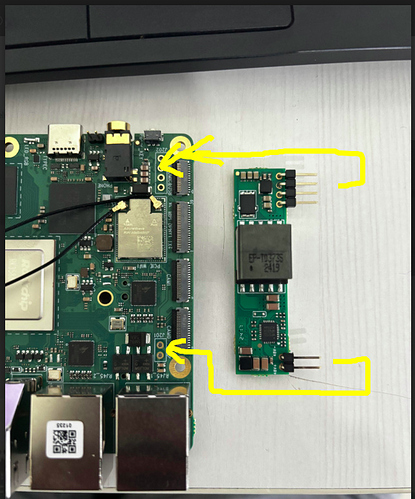Hi @jack
FYI,
sudo dmesg | grep pcie
[sudo] password for radxa:
[ 10.824048] reg-fixed-voltage vcc3v3-pcie2x1l0: Looking up vin-supply from device tree
[ 10.824054] vcc3v3_pcie2x1l0: supplied by vcc5v0_sys
[ 10.884895] vcc3v3_pcie2x1l0: 3300 mV, enabled
[ 10.884972] reg-fixed-voltage vcc3v3-pcie2x1l0: vcc3v3_pcie2x1l0 supplying 3300000uV
[ 10.885034] vcc3v3_pcie30: 3300 mV, disabled
[ 10.885082] reg-fixed-voltage vcc3v3-pcie30: Looking up vin-supply from device tree
[ 10.885088] vcc3v3_pcie30: supplied by vcc5v0_sys
[ 10.885120] reg-fixed-voltage vcc3v3-pcie30: vcc3v3_pcie30 supplying 3300000uV
[ 11.465301] rk-pcie fe150000.pcie: invalid prsnt-gpios property in node
[ 11.465388] rk-pcie fe150000.pcie: Looking up vpcie3v3-supply from device tree
[ 11.465452] rk-pcie fe160000.pcie: invalid prsnt-gpios property in node
[ 11.465531] rk-pcie fe160000.pcie: Looking up vpcie3v3-supply from device tree
[ 11.465576] rk-pcie fe170000.pcie: invalid prsnt-gpios property in node
[ 11.465678] rk-pcie fe170000.pcie: Looking up vpcie3v3-supply from device tree
[ 11.482406] rk-pcie fe170000.pcie: host bridge /pcie@fe170000 ranges:
[ 11.482424] rk-pcie fe170000.pcie: IO 0x00f2100000…0x00f21fffff -> 0x00f2100000
[ 11.482435] rk-pcie fe170000.pcie: MEM 0x00f2200000…0x00f2ffffff -> 0x00f2200000
[ 11.482443] rk-pcie fe170000.pcie: MEM 0x0980000000…0x09bfffffff -> 0x0980000000
[ 11.482463] rk-pcie fe150000.pcie: host bridge /pcie@fe150000 ranges:
[ 11.482501] rk-pcie fe170000.pcie: iATU unroll: enabled
[ 11.482505] rk-pcie fe170000.pcie: iATU regions: 8 ob, 8 ib, align 64K, limit 8G
[ 11.482517] rk-pcie fe160000.pcie: host bridge /pcie@fe160000 ranges:
[ 11.482545] rk-pcie fe150000.pcie: IO 0x00f0100000…0x00f01fffff -> 0x00f0100000
[ 11.482598] rk-pcie fe160000.pcie: IO 0x00f1100000…0x00f11fffff -> 0x00f1100000
[ 11.482601] rk-pcie fe150000.pcie: MEM 0x00f0200000…0x00f0ffffff -> 0x00f0200000
[ 11.482631] rk-pcie fe150000.pcie: MEM 0x0900000000…0x093fffffff -> 0x0900000000
[ 11.482643] rk-pcie fe160000.pcie: MEM 0x00f1200000…0x00f1ffffff -> 0x00f1200000
[ 11.482672] rk-pcie fe160000.pcie: MEM 0x0940000000…0x097fffffff -> 0x0940000000
[ 11.482707] rk-pcie fe150000.pcie: iATU unroll: enabled
[ 11.482716] rk-pcie fe150000.pcie: iATU regions: 8 ob, 8 ib, align 64K, limit 8G
[ 11.482734] rk-pcie fe160000.pcie: iATU unroll: enabled
[ 11.482744] rk-pcie fe160000.pcie: iATU regions: 8 ob, 8 ib, align 64K, limit 8G
[ 11.673314] vcc3v3_pcie2x1l2: will resolve supply early: vin
[ 11.673327] reg-fixed-voltage vcc3v3-pcie2x1l2: Looking up vin-supply from device tree
[ 11.673345] vcc3v3_pcie2x1l2: supplied by vcc_3v3_s3
[ 11.673684] vcc3v3_pcie2x1l2: 3300 mV, enabled
[ 11.673865] reg-fixed-voltage vcc3v3-pcie2x1l2: vcc3v3_pcie2x1l2 supplying 3300000uV
[ 11.673979] reg-fixed-voltage vcc3v3-pcie2x1l1: Looking up vin-supply from device tree
[ 11.673990] vcc3v3_pcie2x1l1: supplied by vcc_3v3_s3
[ 11.674328] vcc3v3_pcie2x1l1: 3300 mV, enabled
[ 11.674454] reg-fixed-voltage vcc3v3-pcie2x1l1: vcc3v3_pcie2x1l1 supplying 3300000uV
[ 11.675206] rk-pcie fe180000.pcie: invalid prsnt-gpios property in node
[ 11.675279] rk-pcie fe180000.pcie: Looking up vpcie3v3-supply from device tree
[ 11.675553] rk-pcie fe190000.pcie: invalid prsnt-gpios property in node
[ 11.675694] rk-pcie fe190000.pcie: Looking up vpcie3v3-supply from device tree
[ 11.676175] rk-pcie fe180000.pcie: host bridge /pcie@fe180000 ranges:
[ 11.676201] rk-pcie fe180000.pcie: IO 0x00f3100000…0x00f31fffff -> 0x00f3100000
[ 11.676215] rk-pcie fe180000.pcie: MEM 0x00f3200000…0x00f3ffffff -> 0x00f3200000
[ 11.676225] rk-pcie fe180000.pcie: MEM 0x09c0000000…0x09ffffffff -> 0x09c0000000
[ 11.676279] rk-pcie fe180000.pcie: iATU unroll: enabled
[ 11.676284] rk-pcie fe180000.pcie: iATU regions: 8 ob, 8 ib, align 64K, limit 8G
[ 11.676605] rk-pcie fe190000.pcie: host bridge /pcie@fe190000 ranges:
[ 11.676650] rk-pcie fe190000.pcie: IO 0x00f4100000…0x00f41fffff -> 0x00f4100000
[ 11.676694] rk-pcie fe190000.pcie: MEM 0x00f4200000…0x00f4ffffff -> 0x00f4200000
[ 11.676719] rk-pcie fe190000.pcie: MEM 0x0a00000000…0x0a3fffffff -> 0x0a00000000
[ 11.676800] rk-pcie fe190000.pcie: iATU unroll: enabled
[ 11.676811] rk-pcie fe190000.pcie: iATU regions: 8 ob, 8 ib, align 64K, limit 8G
[ 11.684316] rk-pcie fe150000.pcie: PCIe Linking… LTSSM is 0x0
[ 11.684995] rk-pcie fe160000.pcie: PCIe Linking… LTSSM is 0x0
[ 11.705445] rk-pcie fe150000.pcie: PCIe Linking… LTSSM is 0x0
[ 11.705915] rk-pcie fe160000.pcie: PCIe Linking… LTSSM is 0x0
[ 11.725963] rk-pcie fe150000.pcie: PCIe Linking… LTSSM is 0x0
[ 11.727032] rk-pcie fe160000.pcie: PCIe Linking… LTSSM is 0x0
[ 11.741983] rk-pcie fe170000.pcie: PCIe Link up, LTSSM is 0x30011
[ 11.741997] rk-pcie fe170000.pcie: PCIe Gen.1 x1 link up
[ 11.742152] rk-pcie fe170000.pcie: PCI host bridge to bus 0002:20
[ 11.747013] rk-pcie fe150000.pcie: PCIe Linking… LTSSM is 0x0
[ 11.748148] rk-pcie fe160000.pcie: PCIe Linking… LTSSM is 0x0
[ 11.764354] pcieport 0002:20:00.0: PME: Signaling with IRQ 138
[ 11.768138] rk-pcie fe150000.pcie: PCIe Linking… LTSSM is 0x1
[ 11.769268] rk-pcie fe160000.pcie: PCIe Linking… LTSSM is 0x0
[ 11.941866] rk-pcie fe190000.pcie: PCIe Link up, LTSSM is 0x130011
[ 11.941865] rk-pcie fe180000.pcie: PCIe Link up, LTSSM is 0x130011
[ 11.941892] rk-pcie fe180000.pcie: PCIe Gen.2 x1 link up
[ 11.941903] rk-pcie fe190000.pcie: PCIe Gen.2 x1 link up
[ 11.944324] rk-pcie fe190000.pcie: PCI host bridge to bus 0004:40
[ 11.944372] rk-pcie fe180000.pcie: PCI host bridge to bus 0003:30
[ 11.984617] pcieport 0003:30:00.0: PME: Signaling with IRQ 148
[ 12.003029] pcieport 0004:40:00.0: PME: Signaling with IRQ 158
[ 13.777160] rk-pcie fe160000.pcie: PCIe Link Fail, LTSSM is 0x0, hw_retries=0
[ 13.777246] rk-pcie fe160000.pcie: failed to initialize host
[ 13.780109] rk-pcie fe150000.pcie: PCIe Link Fail, LTSSM is 0x0, hw_retries=0
[ 13.780194] rk-pcie fe150000.pcie: failed to initialize host
[ 13.780917] rockchip-pm-domain fd8d8000.power-management:power-controller: Looking up pcie-supply from device tree
[ 13.780982] rockchip-pm-domain fd8d8000.power-management:power-controller: Looking up pcie-supply property in node /power-management@fd8d8000/power-controller failed
radxa@rock-5t:~$
Kindly let me know if anything going wrong.

